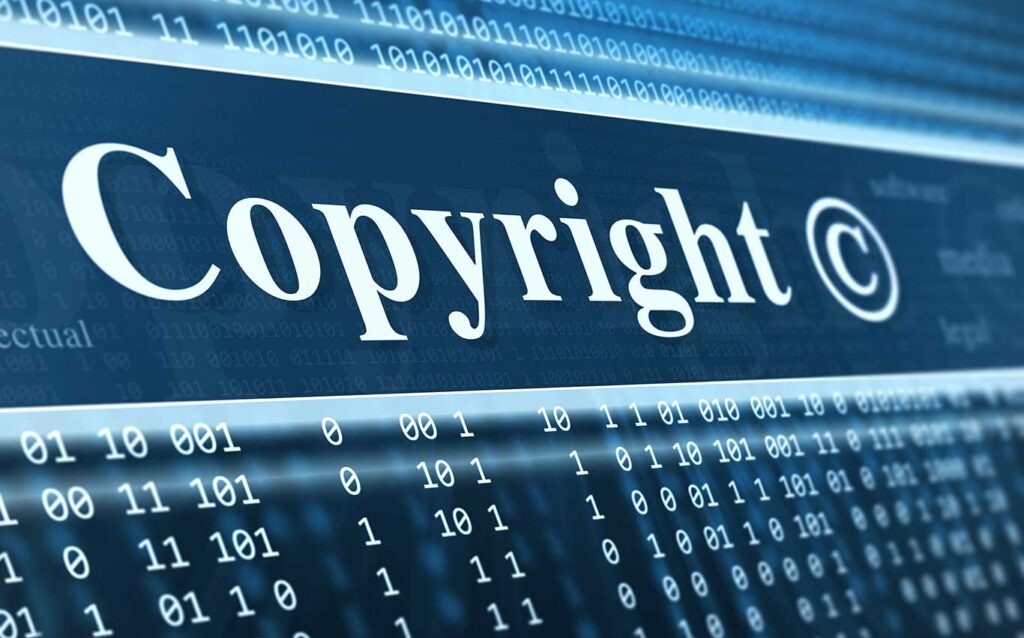A copyright owner has the exclusive right to reproduce copies of the work, prepare derivative works, distribute copies, perform the work, and display the work.
Copyright Basics
A copyright is a form of protection provided for “original works of authorship” that are fixed in a tangible medium. Copyright protection is automatic from the moment an original work of authorship is fixed. To enforce a copyright in Federal Court you must first have an issued copyright registration (simply filing for copyright protection is insufficient). Importantly, copyrights only protect the original expression of ideas – not the underlying ideas themselves.
Common examples of the types of works for which copyright protection can apply include: Literary works, Musical works, Dramatic works, Pictorial, Graphic, and Sculptural works, Audiovisual works, Sound recordings, and Architectural works.
Notwithstanding the list above, copyrights do NOT protect the following:
- Ideas, procedures, methods, systems, processes, concepts, principles, or discoveries
- Works that are not fixed in a tangible form
- Titles, names (including business names), short phrases, slogans
- Familiar symbols or designs
- Mere listings of ingredients or contents
As an emerging business, there are several things you should consider regarding your company’s copyrights:
Should you file for federal registration of your copyrights?
Copyright protection is automatic from the moment an original work of authorship is fixed. However, in order to file suit in federal court to enforce your copyrights you must have an issued registration. The benefits of registration are as follows: (1) it is necessary to bring an infringement suit, (2) it establishes prima facie evidence of the validity of the copyright, (3) if registration is made prior to infringement or within three months of publication, a copyright owner is eligible for statutory damages, attorneys’ fees, and costs, and (4) it allows a copyright owner to establish a record with U.S. Customs for protection against the importation of infringing copies.
Who owns the copyright?
The copyright initially belongs to the author(s) that created the work. However, copyrights are subject to the work-for-hire doctrine. Therefore, when a work is created by an employee as part of the employee’s regular duties, then the owner/author is considered to be the entity that hired the employee. In addition, a work-for-hire relationship can be created with a written agreement that a work created is considered a “work-for-hire” as long as it falls within a certain category of works. These issues can get rather complex so it is advisable to contact an attorney if you anticipate a work-for-hire issue. The final way to acquire copyright ownership is to simply transfer/receive ownership by written agreement.
What should you do if someone is infringing your copyrights or accusing you of infringing their copyrights?
In both cases, the initial step does not ignore the issue as that increases the chance you will end up in litigation. So, the best advice is to consult an attorney and address the issue promptly (especially important with how fast copies of materials can be spread around the Internet). A few things you can do to prevent these issues include: (1) mark all copyright materials with a © followed by the year and owners name – this is not required but provides notice to the public of your assertion of copyright rights, and (2) check your website and promotional materials (and subscriptions) to make sure you are not using, without permission, images or songs or writings that are owned by others. In this day and age, it is very easy to grab stuff from the Internet that appears free to use – and in many non-commercial situations, there is little risk. However, with a business, the risk is considerably higher that any copyright infringement will be noticed and acted upon.
Action Items
- Ensure that your business is the owner of all of the copyrighted material it produces, and mark all such material with a © followed by the year and the company name.
- Consider registering your copyrights – ideally within three months of publication for the most valuable ones.
- Make sure you are authorized to use the copyrights of others – especially on your website/ads.
- Be vigilant and swift in enforcing your copyrights to mitigate their widespread, unauthorized distribution.
Pittsburgh Intellectual Property Attorneys
The attorneys at The Lynch Law Group are experienced in assisting businesses in a wide range of industries with intellectual property litigation and transactional matters. Contact Dan Lynch at dlynch@lynchlaw-group.com or (724) 776-8000 for more information about copyrights or other intellectual property matters.





